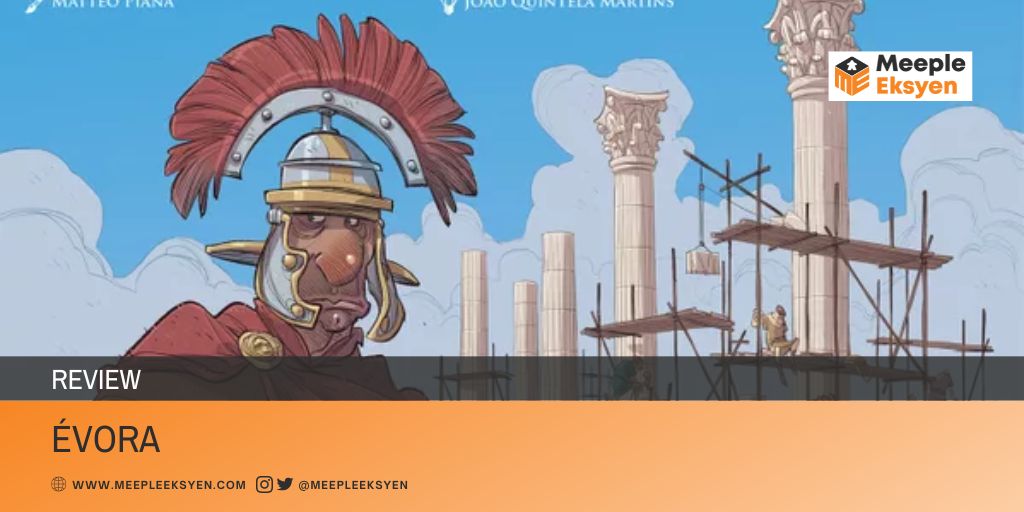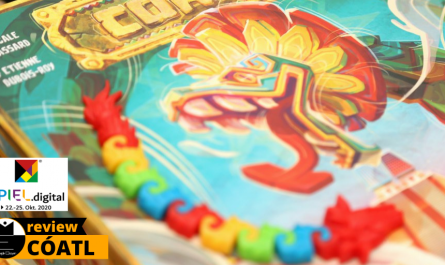The enchanting allure of the Iberian Peninsula has captured the imaginations of many. This particular, exotic part of Europe is weaving its rich historical fabric and vibrant contemporary yarns into the tapestry of many creative media. Both nations, Portugal and Spain, have made significant contributions. Infusing their distinct cultures into this diverse tabletop ecosystem. Although their ancient epochs share numerous similarities, their modern cultures have been ever since evolving independently. João, seeking to explore the former. Setting his sights on Évora, he transports players to the shared era of ancient Roman occupation. This game delves into the origins of this Portugal’s prehistoric city, offering a captivating glimpse into its primordial past.
During the Spiel 2022 event, Mebo Games proudly showcased Évora. And from what I recall, their booth was consistently packed throughout the entire program. It comes as no surprise, as their games never fail to be simply delightful, offering decent entertainment through mechanics and its mere components already. Naturally, I had high expectations that João’s creation would be equally entertaining and leave me thoroughly amused.
A short disclaimer before you read my board game analysis
As an avid euro gamer and hardcore Legend of the Five Rings (L5R) LCG player, my reviews may reflect a preference for these styles, and I may not cover solo games/variants extensively. Please note that my personal remarks are based on my gaming experiences, and I aim to provide honest insights within the scope of my preferences.
This is Évora
Évora is emerging as a lighter category in euro board games. It would be criminal to label it merely as an abstract game, for João and Mebo have perfectly woven together mechanics and thematic elements into harmony. And there is a lot to appreciate about this game. For starters, its quintessence: the rondel mechanic.
Granted, this particular apparatus employed in Évora may not be remarkably unique. The rondel mechanism adheres to the usual enactment — to three vacant action tiles our workers can traverse and activate. João smartly injected a tiny bit to elevate its allure. Whenever any opponent’s worker and/or the Centurion obstruct the chain of the aforementioned tiles, those are made unavailable and thus, bypassed. In essence, only the subsequent three perpetual tiles are open as viable options.
This seemingly uncomplicated implementation bestows a plain yet consequential strategic layer that demands careful moves. It may be unpretentious, but its impact unfurls an entirely deeper decision-making within the game. By deftly exploiting this mechanic, it enables us to impede our adversaries from seizing particular actions.
Area majority in two planes
Alas, Évora is not solely reliant on a single mechanic. While the rondel serves as the driving force, there must also be a purpose, an objective to pursue victory. Area majority in a form of the dominance of the temple’s pillars is entering the equation, where it becomes the paramount to accumulate victory points (VP).
Constructing the pillars adheres to the ancient Roman method. It involves stacking slabs vertically, and one of the objectives is to secure the majority within a particular pillar. However, it is erroneous to focus solely on the vertical majority in one pillar. Especially when we do have like 14 in total.
While it does contribute a respectable five VPs, the horizontal inter-pillar majority holds equal, if not higher, significance. Each level, any of the stacked slabs in that particular plane, becomes a competitive battleground, intensifying the stakes and raising the tension. Placing the slabs strategically becomes an intricate task, requiring thoughtful consideration. Through this implementation, the area majority mechanic in Évora gains a multidimensional aspect, enhancing the depth of the gameplay experience.
Closing statements
If I am allowed to lodge a complaint, and though it would be the only bickering I would make on Évora: The artwork doesn’t quite align with my personal taste. However, it doesn’t significantly bother me either.
When it comes to categorizing Évora, I would classify it as a medium euro game. It offers a solid gameplay experience with a level of depth that enhances its strategic value.
The rules of the game are easily understood; the concept is indeed straightforward. However, grasping the intricacies of the game during play requires some effort. This comes as no surprise, considering the complex interactions between the rondel, cards, hand management, and the notable element of area majority. In the end, Évora, the game, can be as pleasing and intoxicating as the real romantic Roman remnants in Alentejo’s region.
Do you love board games as much as we do? Support us!
Thank you for reading our articles! If you enjoyed our work and want more captivating board game contents, make sure to:
👉 Follow us on our social media — you can find us on ![]()
![]()
![]() Click one of the icons to land on our social media, or find us @meepleeksyen there, it’s just a click away! Stay updated with our latest board game reviews and previews by following us on those platforms 📱👍
Click one of the icons to land on our social media, or find us @meepleeksyen there, it’s just a click away! Stay updated with our latest board game reviews and previews by following us on those platforms 📱👍
💬 Do you have contrasting opinions? Leave a comment — share your thoughts with us, we’d love to hear (or read) yours! Have you played this game before? Did you have something similar as well? Or perhaps, something more personal, like what are your favourite board games? Let’s discuss in the comments below!
🙏 Support Us! Your generous support can help us produce even better content in the future. If you love what we do, consider making a donation to our blog. Every contribution counts and means a lot to us! You can either donate locally with Indonesian Rupiah (IDR) via Trakteer ![]() or for international readers with another currency through Buy Me a Coffee
or for international readers with another currency through Buy Me a Coffee ![]() It helps us to survive, too! 💰 Click one of the button below 👇
It helps us to survive, too! 💰 Click one of the button below 👇
I am a full-time food technologist during weekdays. However, when the calendar hits weekends, I transform into an avid board gamer. I am a hardcore Legend of the Five Rings (L5R) LCG player from Fantasy Flight Games (FFG). Current hobby: buying board games. My shelf of shame’s list is getting longer, thanks to you, Kickstarter.





